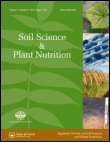
SOIL SCIENCE AND PLANT NUTRITION
Scope & Guideline
Cultivating knowledge in soil science and nutrition.
Introduction
Aims and Scopes
- Soil-Plant Interactions:
Investigating the interactions between soil properties and plant growth, this area encompasses studies on nutrient availability, uptake mechanisms, and the role of soil microorganisms in promoting plant health. - Soil Fertility and Management:
Research in this scope focuses on sustainable soil management practices, including the use of organic amendments, biofertilizers, and nutrient cycling to improve soil fertility and enhance crop yields. - Environmental Impact of Soil Management:
This includes studies on the effects of soil management practices on greenhouse gas emissions, soil erosion, and other environmental aspects, aiming to develop strategies for mitigating negative impacts on ecosystems. - Soil Chemistry and Physics:
The journal covers research on the chemical and physical properties of soils, including nutrient dynamics, soil structure, and the influence of soil amendments on these properties. - Innovative Soil Testing and Monitoring Techniques:
An emphasis on developing and applying new techniques for soil analysis, such as remote sensing, machine learning, and spectroscopy, to improve soil characterization and management practices.
Trending and Emerging
- Sustainable Agriculture Practices:
There is an increasing emphasis on sustainable farming techniques, including integrated nutrient management and the use of cover crops, to enhance soil health and reduce environmental impact. - Climate Change Mitigation:
Research exploring the role of soils in climate change mitigation, particularly through carbon sequestration and greenhouse gas emissions reduction, is gaining momentum in response to global climate concerns. - Microbial Soil Health and Functionality:
The study of soil microbiomes and their influence on nutrient cycling, plant health, and soil fertility is becoming a focal point, highlighting the importance of soil biology in agricultural productivity. - Innovative Soil Remediation Techniques:
Emerging studies are exploring innovative methods for soil remediation, including the use of biochar and phytoremediation, to address soil contamination and improve soil quality. - Precision Agriculture and Technology Integration:
The integration of technology in agriculture, such as drones and remote sensing for soil monitoring, is a trending area, reflecting the need for data-driven approaches to enhance soil management.
Declining or Waning
- Traditional Soil Fertility Practices:
Research focused on conventional soil fertility practices, such as the use of chemical fertilizers without consideration for organic amendments, has seen a decline as sustainable practices gain traction. - Single Nutrient Focus Studies:
There is a noticeable reduction in studies that focus solely on individual nutrients like nitrogen or phosphorus, as current research increasingly emphasizes the importance of multi-nutrient interactions and holistic soil health. - Localized Soil Studies:
Research that concentrates exclusively on specific regions or soil types without broader applicability is becoming less common, as there is a growing demand for studies that address global soil management challenges.
Similar Journals
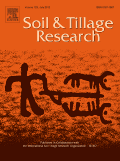
SOIL & TILLAGE RESEARCH
Transforming Agriculture Through Soil InsightsSOIL & TILLAGE RESEARCH is a premier international journal dedicated to advancing the understanding of soil science and tillage practices through high-quality research and insightful reviews. Published by Elsevier and based in the Netherlands, this esteemed journal boasts impressive impact metrics, being ranked in the Q1 category across multiple domains including Agronomy and Crop Science, Earth-Surface Processes, and Soil Science, reflecting its pivotal role in the academic community. With an H-Index that underscores its citation impact and a Scopus ranking placing it in the top percentiles of its field, SOIL & TILLAGE RESEARCH serves as a vital resource for researchers and professionals focusing on sustainable agricultural practices, soil management, and environmental conservation. This journal provides a platform for open dialogue and dissemination of knowledge that shapes future research directions and policy-making in land use and sustainable agriculture.
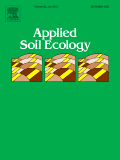
APPLIED SOIL ECOLOGY
Bridging Theory and Practice in Soil EcologyApplied Soil Ecology, published by Elsevier, is a premier journal dedicated to advancing the field of soil ecology through rigorous research and innovative methodologies. With an impressive impact factor and a consistent placement in the Q1 quartile across various categories including Agricultural and Biological Sciences, Ecology, and Soil Science, this journal underscores its significance in the scientific community. The journal's scope encompasses critical areas such as soil biology, microbial ecology, and the role of soils in ecosystem services, aiming to foster collaboration and knowledge exchange among researchers, professionals, and students. The convergence of research efforts from 1994 to 2024 highlights its commitment to maintaining current and relevant discourse within the field. While open access options are not available, the quality and depth of the articles published ensure that the latest findings and discussions are accessible through institutional subscriptions. With a strong focus on empirical studies and applied research, Applied Soil Ecology is an essential resource for anyone interested in the complexities of soil ecosystems and their impact on the environment.

Soil Research
Exploring the vital role of soil in our ecosystem.Soil Research, published by CSIRO PUBLISHING, is an esteemed scholarly journal dedicated to advancing the field of soil science, environmental science, and earth-surface processes. With an ISSN of 1838-675X and E-ISSN of 1838-6768, this journal serves as a vital platform for researchers and professionals to disseminate innovative findings and engage with contemporary challenges in soil and environmental management. The journal is recognized for its impactful contributions, as evidenced by its Q2 ranking in 2023 across multiple categories including Earth-Surface Processes, Environmental Science, and Soil Science, reflecting its influence and relevance in these critical academic areas. Operating from its headquarters in Clayton, Victoria, Australia, Soil Research is committed to fostering open access to research, ensuring wider dissemination of knowledge. As it converges toward its future objectives until 2024, the journal aims to provide a forum for diverse perspectives that enhance understanding and stewardship of soil resources, making it an indispensable resource for students, researchers, and industry professionals alike.

NUTRIENT CYCLING IN AGROECOSYSTEMS
Advancing Sustainable Practices in AgroecosystemsNUTRIENT CYCLING IN AGROECOSYSTEMS is a premier academic journal published by SPRINGER, dedicated to advancing the field of agroecosystem research. With an ISSN of 1385-1314 and an E-ISSN of 1573-0867, the journal has achieved remarkable standing, being ranked in the Q1 category for both Agronomy and Crop Science and Soil Science as of 2023. Over the years, it has emerged as an essential platform for interdisciplinary research focused on nutrient management, soil health, and sustainable agriculture practices, reflecting a growing global interest in environmental sustainability. The journal's impactful contributions are highlighted by its impressive Scopus rankings, where it stands at #68/406 and in the 83rd percentile for Agronomy and Crop Science, and #37/159 with a 77th percentile in Soil Science. Researchers, professionals, and students are invited to explore open access options for published articles, facilitating wider dissemination of knowledge in nutrient cycling and its critical implications for agroecological systems. Join the discourse by submitting your research and contributing to the ongoing conversation in this vital area of study.
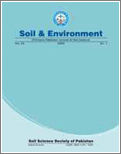
Soil & Environment
Championing Open Access Research in Soil and Environmental SciencesSoil & Environment is a distinguished open access journal published by the University of Agriculture, Institute of Soil & Environmental Sciences, located in Faisalabad, Pakistan. Established in 2006, this journal has become a vital platform for disseminating pioneering research in the fields of Environmental Science and Soil Science. With an ISSN of 2074-9546, it provides a wealth of knowledge through accessible academic articles, particularly focusing on sustainable practices and innovations that impact soil and environmental health. Although currently categorized in Q4 within both Environmental Science (miscellaneous) and Soil Science, the journal is dedicated to enhancing its influence and visibility as it progresses towards convergence years that span from 2010 to 2024. Researchers, professionals, and students will find Soil & Environment an essential resource for staying informed about the latest developments and methodologies in soil conservation and environmental sustainability. By offering publicly accessible content, the journal aims to foster greater collaboration and knowledge-sharing within the global scientific community.

Soil Systems
Transforming Soil Knowledge into Environmental SolutionsSoil Systems, published by MDPI, is a premier open access journal dedicated to advancing the understanding of soil science and earth-surface processes. Launched in 2017, this journal has quickly established itself with a strong presence in the academic community, holding a prestigious Q1 ranking in both Earth-Surface Processes and Soil Science as of 2023. With an impressive Scopus rank in the top 20% of its categories, Soil Systems is an essential platform for disseminating groundbreaking research addressing the challenges and complexities of soil management, its ecological significance, and its role in sustainable development. The journal operates under an open access model since 2018, ensuring maximum visibility and accessibility for researchers, professionals, and students alike. Based in Switzerland, at ST ALBAN-ANLAGE 66, CH-4052 BASEL, Soil Systems encourages contributions that promote interdisciplinary collaboration, innovative methodologies, and the application of findings to real-world issues related to soil health and environmental sustainability.
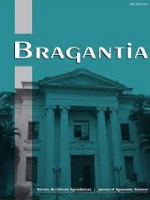
BRAGANTIA
Cultivating Insights for Agricultural ExcellenceBRAGANTIA, published by the Instituto Agronômico, is a distinguished open access journal that has been a vital resource since its inception in 1977. With an ISSN of 0006-8705 and E-ISSN 1678-4499, this journal is recognized for its contributions to the field of Agricultural and Biological Sciences, where it currently holds a respectable Q2 ranking as of 2023. Additionally, BRAGANTIA is indexed in various databases, supporting its impact within Materials Science (Q3 ranking). Positioned in Brazil, the journal promotes the dissemination of high-quality research, aiming to bridge the gap between academia and practical applications in agricultural innovation and sustainability. Researchers, professionals, and students looking to keep abreast of recent advancements and their implications will find BRAGANTIA to be an indispensable platform for sharing and accessing vital agricultural knowledge.
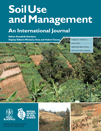
SOIL USE AND MANAGEMENT
Exploring the nexus of agriculture and environmental stewardship.SOIL USE AND MANAGEMENT is a premier academic journal published by Wiley, focusing on the critical domains of Agronomy, Crop Science, Pollution, and Soil Science. With an ISSN of 0266-0032 and an E-ISSN of 1475-2743, the journal has established itself as a vital resource in the field since its inception in 1985. Operating from its U.S. headquarters in Hoboken, NJ, SOIL USE AND MANAGEMENT boasts impressive Q1 rankings across its relevant categories, indicating its standing in the top tier of research journals. Notably, it is ranked 48th out of 406 journals in Agronomy and Crop Science and holds an 88th percentile position, as well as a commendable rank of 26th out of 159 journals in Soil Science, underscoring its influence and reach. This journal serves as an essential platform for researchers, professionals, and students dedicated to sustainable soil management practices and understanding soil's role in agricultural productivity and environmental health. Although it does not offer Open Access, its rigorous peer-review process ensures the publication of high-quality original research, reviews, and case studies critical for advancing knowledge and practice in the field. This journal is crucial for anyone engaged in soil science and its related disciplines, encouraging innovative approaches to challenges facing soil use and management today.

SOIL SCIENCE SOCIETY OF AMERICA JOURNAL
Shaping Agricultural Practices Through Soil ResearchWelcome to the SOIL SCIENCE SOCIETY OF AMERICA JOURNAL, a premier publication in the field of soil science, published by WILEY. With a distinguished history dating back to 1976, this journal has consistently provided a platform for researchers to share innovative findings and insights into soil’s critical role in agricultural and ecological systems. Featuring an impressive Q1 category ranking in Soil Science and positioned within the top 25% of its field according to Scopus, this journal is recognized for its impactful contributions to advancing our understanding of soil dynamics. While not an open-access journal, it remains a valuable resource for academics and professionals alike, with distinguished articles that meet the highest scientific standards. As it enters its converged years from 1976 to 2024, the journal aims to continue shaping the future of soil research, offering valuable knowledge to students, researchers, and practitioners dedicated to sustainable land management and environmental preservation.

Frontiers in Soil Science
Transforming soil science through collaboration.Frontiers in Soil Science, published by FRONTIERS MEDIA SA in Switzerland, is an esteemed open-access journal dedicated to advancing our understanding of soil systems and their vital role in ecosystem functioning and sustainable agricultural practices. Since its inception in 2021, this journal has quickly established itself within the scientific community, boasting a 2023 Scopus Q2 ranking in Soil Science and a notable percentile of 41 among its peers. Researchers and practitioners in the field will find a wide array of original research, reviews, and contributions that address key topics such as soil health, carbon sequestration, and nutrient cycling. With a commitment to fostering collaboration and dissemination of knowledge, Frontiers in Soil Science serves as a vital resource for professionals, researchers, and students who aspire to innovate and lead in soil science research.